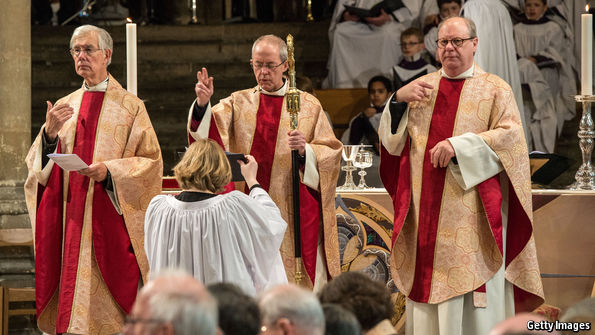Downgrading the position of the gay-friendly American wing appeases conservatives

AGAINST the expectations of many, leaders of the world’s Anglican churches have managed to avert a complete breakdown in the Anglican Communion by downgrading the position of the gay-friendly American wing of Anglicanism, the Episcopal Church, within the Communion. The 39 primates or national church leaders, in effect, also warned other liberal churches, like the Anglican Church of Canada, against following the Episcopalians in recognising same-sex marriage.
After four days of difficult talks, they issued a statement expressing the desire to continue “walking together” as a Communion but affirming that most of them took a traditional view of marriage as a sacred rite involving a man and a woman. The statement called the Episcopal Church’s acceptance of same-sex marriage “a fundamental departure from the faith and teaching held by the majority of our provinces on the doctrine of marriage”. As a result, the liberal Americans were excluded for three years from representing Anglicanism at interfaith deliberations and from voting, though not from participating, in certain pan-Anglican forums.
These measures may not make a huge difference, considering that the global Anglican structure is already quite loose, but the Episcopal Church’s leader, Bishop Michael Curry, said they would hurt. “For fellow disciples of Jesus in our church who are gay or lesbian this will bring more pain,” he said. The sanctions will give heart to conservative Episcopal groups in America who are fighting battles over property with the church’s liberal leaders, having seceded from the Episcopal Church over the issue of gay marriage. And it remains possible that the measures could be renewed if, as expected, the Episcopalians affirm support for same-sex marriage at their convention in 2018.
The gathering in Canterbury had been seen as a last throw of the dice to try to hold together the 85m-strong Communion, the world’s third-largest group of Christians. Though the statement said there was “neither victor nor vanquished” it was clear that the traditionalists had gained some satisfaction, though not everything they wanted. The statement avoided using words like “sanctions” and “punishment”; conservatives had wanted the liberals not merely to be punished but called on to repent.
Had they gained no satisfaction at all, conservatives were poised to leave the Communion; they were dismayed that the Episcopal Church’s change in its own rules on marriage had brought no immediate consequences. The primates’ statement said that American Episcopalians had taken “unilateral actions on a matter of doctrine” which most in the Communion saw as “a departure from mutual accountability and interdependence”.
Archbishop Justin Welby persuaded all the African conservatives—except one—to stay in the room. If the conservatives had left definitively to form their own breakaway Anglican Communion, liberal North Americans might have had more say. Since being appointed in 2013, the archbishop has managed to impress conservatives, including African ones, by stressing his traditional view on marriage, while scoring some liberal points by overcoming pockets of opposition in the Church of England to the appointment of women bishops. A further communiqué released by the primates condemned homophobic prejudice and violence, and recognised that the Anglican church had often acted in a way that has “caused deep hurt” to gay people. They reaffirmed their rejection of the criminalisation of gay people, and that God’s love for every human being was the same, regardless of sexuality.
For now, then, the Communion has been saved. Archbishop Welby, a former oil executive sometimes criticised for being too managerial, has performed what some will call a miracle. His overall victory may be Pyrrhic, however, as he may well have to spend more time in future trying to hold the Communion together. Part of that process may be the next Lambeth conference, the once-a-decade gathering of Anglican leaders, which he announced will take place in 2020. The event had been on hold because of the disputes about gay marriage.
The archbishop’s declared priorities include spreading the Christian faith and bringing reconciliation to strife-torn places. In the immediate future, he will need to do some reconciling within the Church of England, as liberals fume over the fact that he has purchased a precarious global consensus by taking the conservative side at a time when British society is moving in the other direction.


Be the first to comment